Post by Mark Lavallee on Sept 26, 2012 14:53:00 GMT -5
Now we've arrived smack dab in the early/mid 80s to the two most controversial and loathed albums in the Jethro Tull catalog. Ian Anderson's 1983 solo debut Walk Into Light and Jethro Tull's sister-album 1984's Under Wraps. Gone were the lush prog arrangements, the folk influence, the blues guitar. Indeed, it was the 80s, why have drums when you can program a Linn drum machine? On Walk Into Light why have bass when a synth will do? Oh dear.

First up, Walk Into Light, released on November 18th, 1983 where it quickly fizzled out peaking at a lowly 202 in the US and a slightly more respectable #78 in the UK.
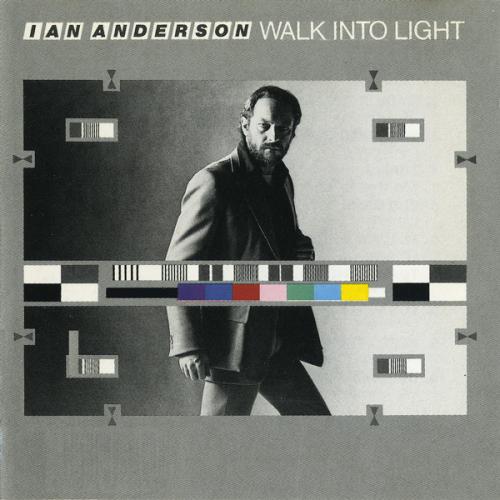
Done in collaboration with Tull keyboardist Peter-John Vettese (who better for an 80s synth album than the man behind all those famous synths on the Eurythmics and other bands?), indeed half of the album's songs are cowrites, a very, very rare occurrence with Anderson indeed. Vettesse completely dominates the album with your typical 80s synths, Anderson played everything else, some bass buried in there amongst the mostly synth bass dominated tracks, all the gutars and of course his signature flute.

Almost universally loathed by Tull fans, this is a gem of an album featuring some incredible singing, great melodic tunes and a true sign on an artist "progressing" with the then available technology. No carbon copy of Aqualung or Thick As A Brick here. This was a modern album indeed.
Side A opens with the single from the album, the wonderful Fly By Night and immediately the stage is set. Very catchy song with a great fluttering synthesized riff blended with piano and Anderson's flute and a nice strong melody.
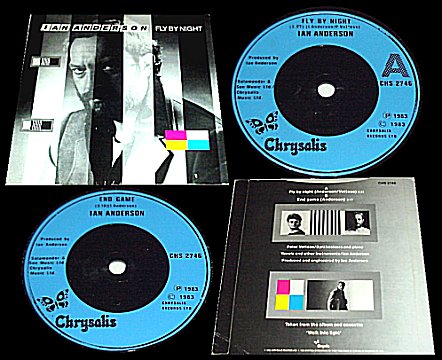
Made In England is, like most of the album, a direct lyrical cousin to the themes of the latest Tull release Broadsword & The Beast, a song about the economic crises in the country at the time. Some nice, complex drum programming in this song.
Next we have the title track with it's jittery rhythm and stabs of electric guitar, no real big vocal hook here, the song being made by it's propulsive beat. Good stuff.
Trains has a nice chugging rhythm, is evocative of Kraftwerk.
The album side concludes with End Game and another great vocal from Ian.
Side two opens with the haunting Black And White Television about a dead man looking back on his life. A nice plodding beat and a great impassioned vocal from Anderson here. One of my favorites.
Next up is Toad In The Hole. A warm love song and one of the album's highlights.
Looking For Eden is another song dealing with Britain's economic situation. Nice arrangement on this one and another great vocal.
User-Friendly deals with the then new idea of computers and the personal disconnect they create.
The album concludes with the absolutely wonderful highlight Different Germany. Dealing with the rise of fascists in the late 70s/early 80s there. An absolutely brilliant piece of symphonic synthesized music. Bits of this arrangement would make it into the closing of Tull's sets throughout the 80s, pretty much unbeknowst to the audience.
There you have it, one thing to completely go against all expectations on a solo album, indeed that's what they're for. But when Tull reconvened for their new one and it's in all manner of speaking the perfect counterpart, well, the fanbase was left in complete bewilderment.

Released on September 7th, 1984 Under Wraps would prove to be Tull's lowest charting album in the US (until the 90s anyway), stalling at #76, in the UK bizarrely it peaked at #19, their highest placing since Songs From The Wood in 1977.

Again working closely with Peter-John Vettesse as a cowriter, and indeed Martin Barre on a couple numbers, and keeping the Linn drum machine in place of a live drummer, the album is in every way a continuation of Walk Into Light. The presence of Dave Pegg on bass keeps things a little more organic, just a little. Indeed, despite it's very electric nature this remains Martin Barre's favorite Tull album.
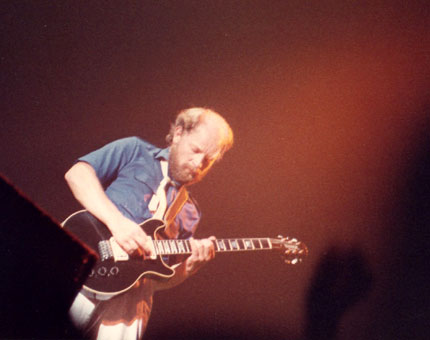
Anderson has a great love of spy novels, particularly the work of John Le Carré and this inerest permeates the songs on the album.
Side A opens with the single (and MTV video!) off the album, the wonderful Lap Of Luxury, which peaked at #30 in the US and #70 in the UK. Instantly reminiscent of the Walk Into Light album, only Barre's incomparable guitar tone really sets it apart. A great, very catchy song.
Next up we have Under Wraps #1 The first of our spy songs, the old James Bond ploy of sleeping with the enemy and who is tricking whom? A great propulsive rhythm, a very modern Tull with a great melody and vocal from Ian.
Up next is European Legacy a strong song about how differing cultural influences combine to form the new culture. Very catchy melody here.
Next we have one of my favorites the spy themed Later, That Same Evening. The lyrics in this one give it a very filmic quality. Great haunting backing with a great melody and delivery.
The spy theme continues with Saboteur, a song about the psychopathic nature of those who become contract killers. Great melody here.
Side A concludes with Radio Free Moscow, a sarcastic take on Radio Free Europe and it's nature as propaganda. Another great vocal from Ian here.
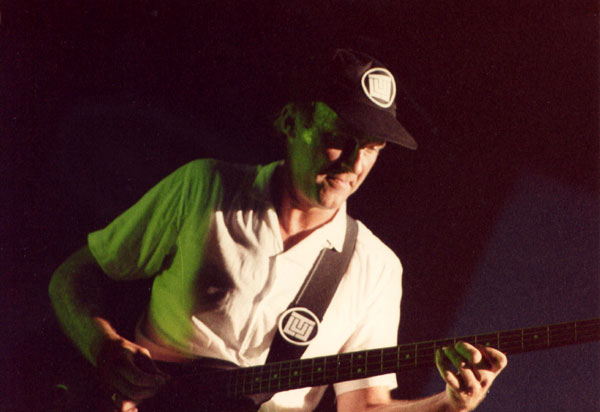
Side B opens with Astronomy, good vocal but in an album that immediately dated itself by embracing the technology of the present this one really hasn't aged well.
Tundra is another track that could best be described as filler. Plods along but nothing particularly interesting there.
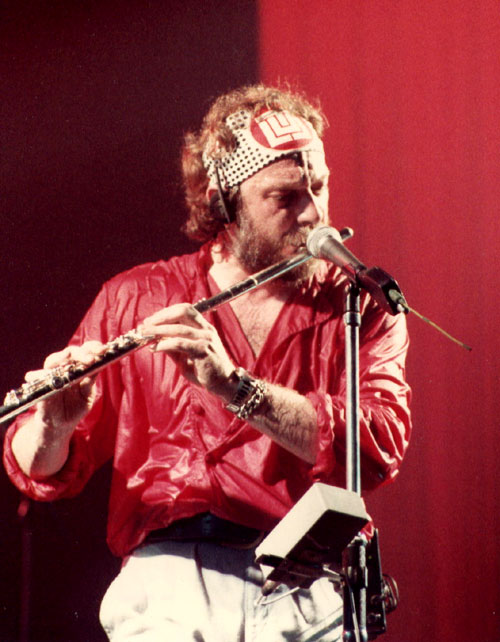
Things definitely pick up with Nobody's Car, another one of the album's spy themed songs and one of the strongest tunes on the album.
Next up is Heat, thematically a continuation of the previous song, unfortunately nowhere near as memorable.
Next we have Under Wraps #2, same song, with a completely traditional acoustic Tull arrangement. A great example of how these songs would have worked given more traditional instrumentation. Throwing a bone to the old fans? A big favorite amongst the diehards.
Next up is Paparazzi. As mundane and unmemorable as it's title. Worked better when it was rearranged as an instrumental...
The album concludes with the poignant song Apogee, a song of space travel gone wrong. The apogee is when the moon or a satellite is at it's furthest distance from the Earth possible. One of the best songs on the album by far.
The album remaster includes two songs originally available on the 12" single of Lap Of Luxury. Automotive Engineering, a song about car technology and General Crossing a song about defecting to the other side. Both rather fillerish. The remaster also includes the video for Lap Of Luxury.
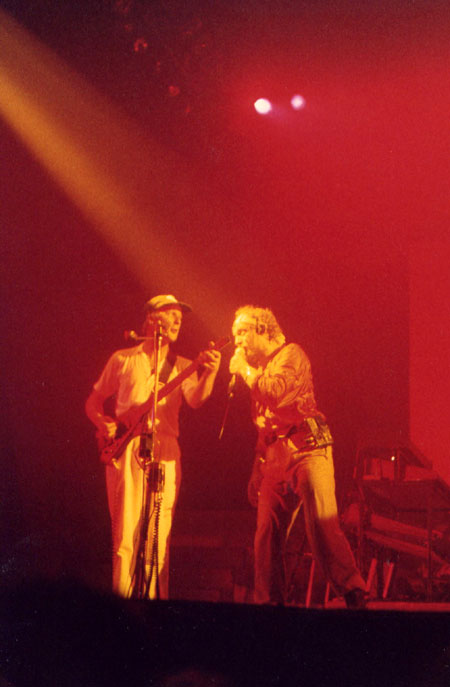
There you have it, for the tour Tull recruited American drummer Doanne Perry (he was one of my teachers at MI!) and he's remained with them ever since.
The highly synthesized nature of these albums leaves them rather cold and hard to get into for a lot people. The presence of several filler tracks doesn't help but there are some serious gems here waiting to be discovered for the more open minded listener.
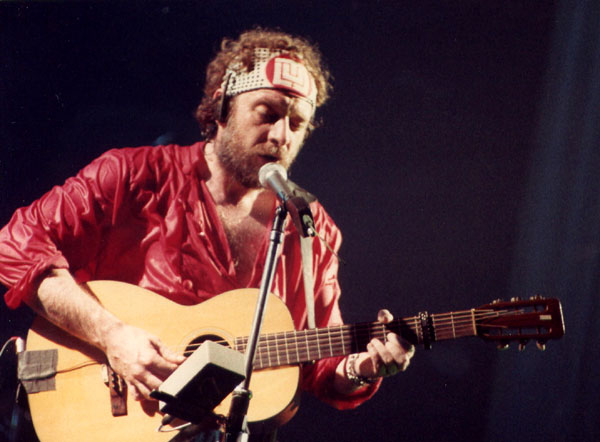
In 1990 Raw Fruit records released Live At Hammersmith '84, taken from a BBC recording. This album featured an instrumental Locomotive Breath, Hunting Girl, Under Wraps #1, Later That Same Evening, Pussy Willow, Living In The Past, Locomotive Breath and Too Old To Rock 'n' Roll. The inclusion of Doanne Perry on live drums brings the new songs to life and the strikingly different arrangements of the older material keeps it very fresh (Too Old is absolutely wonderful with Different Germany incorporated in there.) Shame it's only a small section of the concert because this tour had quite a unique setlist and even included a couple tracks off Walk Into Light.

Final thoughts:
Walk Into Light has some strong songs but a lot of filler and lacks the coherence of the full band. Under Wraps has some much stronger material and benefits from the presence of Martin Barre and Dave Pegg, still, the technology of the time dates the album in a bad way and there's quite a bit of filler here. For diehards only.
Final rating:
3.25 out of 5 stars

First up, Walk Into Light, released on November 18th, 1983 where it quickly fizzled out peaking at a lowly 202 in the US and a slightly more respectable #78 in the UK.

Done in collaboration with Tull keyboardist Peter-John Vettese (who better for an 80s synth album than the man behind all those famous synths on the Eurythmics and other bands?), indeed half of the album's songs are cowrites, a very, very rare occurrence with Anderson indeed. Vettesse completely dominates the album with your typical 80s synths, Anderson played everything else, some bass buried in there amongst the mostly synth bass dominated tracks, all the gutars and of course his signature flute.

Almost universally loathed by Tull fans, this is a gem of an album featuring some incredible singing, great melodic tunes and a true sign on an artist "progressing" with the then available technology. No carbon copy of Aqualung or Thick As A Brick here. This was a modern album indeed.
Side A opens with the single from the album, the wonderful Fly By Night and immediately the stage is set. Very catchy song with a great fluttering synthesized riff blended with piano and Anderson's flute and a nice strong melody.

Made In England is, like most of the album, a direct lyrical cousin to the themes of the latest Tull release Broadsword & The Beast, a song about the economic crises in the country at the time. Some nice, complex drum programming in this song.
Next we have the title track with it's jittery rhythm and stabs of electric guitar, no real big vocal hook here, the song being made by it's propulsive beat. Good stuff.
Trains has a nice chugging rhythm, is evocative of Kraftwerk.
The album side concludes with End Game and another great vocal from Ian.
Side two opens with the haunting Black And White Television about a dead man looking back on his life. A nice plodding beat and a great impassioned vocal from Anderson here. One of my favorites.
Next up is Toad In The Hole. A warm love song and one of the album's highlights.
Looking For Eden is another song dealing with Britain's economic situation. Nice arrangement on this one and another great vocal.
User-Friendly deals with the then new idea of computers and the personal disconnect they create.
The album concludes with the absolutely wonderful highlight Different Germany. Dealing with the rise of fascists in the late 70s/early 80s there. An absolutely brilliant piece of symphonic synthesized music. Bits of this arrangement would make it into the closing of Tull's sets throughout the 80s, pretty much unbeknowst to the audience.
There you have it, one thing to completely go against all expectations on a solo album, indeed that's what they're for. But when Tull reconvened for their new one and it's in all manner of speaking the perfect counterpart, well, the fanbase was left in complete bewilderment.

Released on September 7th, 1984 Under Wraps would prove to be Tull's lowest charting album in the US (until the 90s anyway), stalling at #76, in the UK bizarrely it peaked at #19, their highest placing since Songs From The Wood in 1977.

Again working closely with Peter-John Vettesse as a cowriter, and indeed Martin Barre on a couple numbers, and keeping the Linn drum machine in place of a live drummer, the album is in every way a continuation of Walk Into Light. The presence of Dave Pegg on bass keeps things a little more organic, just a little. Indeed, despite it's very electric nature this remains Martin Barre's favorite Tull album.

Anderson has a great love of spy novels, particularly the work of John Le Carré and this inerest permeates the songs on the album.
Side A opens with the single (and MTV video!) off the album, the wonderful Lap Of Luxury, which peaked at #30 in the US and #70 in the UK. Instantly reminiscent of the Walk Into Light album, only Barre's incomparable guitar tone really sets it apart. A great, very catchy song.
Next up we have Under Wraps #1 The first of our spy songs, the old James Bond ploy of sleeping with the enemy and who is tricking whom? A great propulsive rhythm, a very modern Tull with a great melody and vocal from Ian.
Up next is European Legacy a strong song about how differing cultural influences combine to form the new culture. Very catchy melody here.
Next we have one of my favorites the spy themed Later, That Same Evening. The lyrics in this one give it a very filmic quality. Great haunting backing with a great melody and delivery.
The spy theme continues with Saboteur, a song about the psychopathic nature of those who become contract killers. Great melody here.
Side A concludes with Radio Free Moscow, a sarcastic take on Radio Free Europe and it's nature as propaganda. Another great vocal from Ian here.

Side B opens with Astronomy, good vocal but in an album that immediately dated itself by embracing the technology of the present this one really hasn't aged well.
Tundra is another track that could best be described as filler. Plods along but nothing particularly interesting there.

Things definitely pick up with Nobody's Car, another one of the album's spy themed songs and one of the strongest tunes on the album.
Next up is Heat, thematically a continuation of the previous song, unfortunately nowhere near as memorable.
Next we have Under Wraps #2, same song, with a completely traditional acoustic Tull arrangement. A great example of how these songs would have worked given more traditional instrumentation. Throwing a bone to the old fans? A big favorite amongst the diehards.
Next up is Paparazzi. As mundane and unmemorable as it's title. Worked better when it was rearranged as an instrumental...
The album concludes with the poignant song Apogee, a song of space travel gone wrong. The apogee is when the moon or a satellite is at it's furthest distance from the Earth possible. One of the best songs on the album by far.
The album remaster includes two songs originally available on the 12" single of Lap Of Luxury. Automotive Engineering, a song about car technology and General Crossing a song about defecting to the other side. Both rather fillerish. The remaster also includes the video for Lap Of Luxury.

There you have it, for the tour Tull recruited American drummer Doanne Perry (he was one of my teachers at MI!) and he's remained with them ever since.
The highly synthesized nature of these albums leaves them rather cold and hard to get into for a lot people. The presence of several filler tracks doesn't help but there are some serious gems here waiting to be discovered for the more open minded listener.

In 1990 Raw Fruit records released Live At Hammersmith '84, taken from a BBC recording. This album featured an instrumental Locomotive Breath, Hunting Girl, Under Wraps #1, Later That Same Evening, Pussy Willow, Living In The Past, Locomotive Breath and Too Old To Rock 'n' Roll. The inclusion of Doanne Perry on live drums brings the new songs to life and the strikingly different arrangements of the older material keeps it very fresh (Too Old is absolutely wonderful with Different Germany incorporated in there.) Shame it's only a small section of the concert because this tour had quite a unique setlist and even included a couple tracks off Walk Into Light.

Final thoughts:
Walk Into Light has some strong songs but a lot of filler and lacks the coherence of the full band. Under Wraps has some much stronger material and benefits from the presence of Martin Barre and Dave Pegg, still, the technology of the time dates the album in a bad way and there's quite a bit of filler here. For diehards only.
Final rating:
3.25 out of 5 stars


